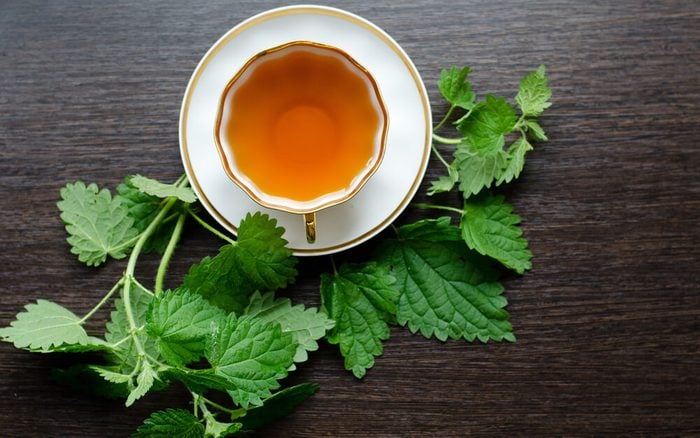8 Surprising Health Benefits of Nettle Tea
Updated: Mar. 14, 2022

Despite the off-putting name, stinging nettle—a flowering plant—is thought to have health benefits (and some risks too).
Our editors and experts handpick every product we feature. We may earn a commission from your purchases.
Maybe you’ve seen stinging nettles at a farmer’s market. If you passed on the plant, who could blame you? Stinging nettle tea might not seem like the coziest mug to warm your hands on a cold day, but this rather ornery-sounding brew has some potential health benefits (and possible risks too; read on for details). Typically made from the leaves and stems of the stinging nettle plant (Latin name: Urtica dioica), this tea is used as a natural remedy for a range of ailments.
“Stinging nettle can be taken orally to improve symptoms related to an enlarged prostate, including frequent, painful, nighttime, or difficulty with urination,” says Catherine Uram, MD, a course instructor and fellow at the University of Arizona’s Andrew Weil Center for Integrative Medicine in Tucson. “It can also help improve symptoms of hay fever, such as nasal congestion and watery eyes, and may be effective in lowering blood sugar and alleviating the pain of osteoarthritis.” (Is black tea already a part of your regular routine? Check out the health benefits from your everyday cup.)
All but one of its subspecies are covered across the leaves and stem with tiny, hollow, bristle-like hairs that release histamines and other chemicals that produce a burning, stinging sensation when they come into contact with skin. Soaking or boiling the stems and leaves, however, renders the plant’s sting-producing chemicals inert. In addition to tea, the plant’s leaves are also used as a cooking ingredient, says Dr. Uram. Try blanching nettle leaves, then using as you would spinach, chard, or parsley.
It’s important to remember stinging nettle can interact with several over-the-counter and prescription medications. “Stinging nettle may lower blood sugar, and if used with diabetes medications, may cause the blood sugar to get too low,” says Dr. Uram. “It may also decrease blood pressure, so taking with blood pressure medications may cause the blood pressure to get too low, as well.”
That’s not all: “Stinging nettles can cause drowsiness, so taking with sedative medications such as sleep and anti-anxiety medications should be avoided,” adds Dr. Uram. “Stinging nettle should also be avoided if taking warfarin (Coumadin), because it may alter how well the medication works. If on lithium, taking stinging nettles can affect how much lithium stays in the body.” (Warfarin is a blood-thinning drug and lithium is a medication often used to treat bipolar disorder.)
Bottom line: Check with your doctor before using stinging nettles or any other new supplement or natural remedy. Here are the essential questions you should ask yourself before starting to take a new medication.
Curious about the plant’s health benefits? Read below for the some possible benefits of nettle tea.
Soothes allergies
In its natural state, the stinging nettle plant stimulates an allergic reaction when its fine hairs touch the skin. However, when prepared as tea, nettles may actually help soothe allergies. A study published in 2017 in the Iranian Journal of Pharmaceutical Research suggests that nettles can help relieve the symptoms of hay fever. Here are other natural remedies that can help you relieve allergy symptoms without relying on medication so you can avoid sniffling and sneezing through the entire season.
Treats muscle and joint pain
Because of its natural anti-inflammatory and analgesic (aka pain-relieving) properties, nettles have been used for centuries to treat sore, stiff muscles and joints. Nettles may help alleviate the symptoms of osteoarthritis and joint pain, typically in the case of hands, knees, hips, and spine, according to a review of research published in 2018 in the journal Molecules. In the review, researchers also found that nettles can work in combination with nonsteroidal anti-inflammatory drugs (NSAIDs), allowing people to decrease their use of NSAIDs. An anti-inflammatory diet may also reduce pain and keep inflammation in check. Make sure you have these staples of a pain- and inflammation-fighting diet.
Strengthens bones
Nettle flours deliver bone-fortifying calcium, magnesium, and iron, according to research, including a study published in 2016 in Food Science & Nutrition. The plant also contains vitamins D and K, which help bones use calcium to protect bone density. Magnesium is stored in the bones, supports bone strength, and aids in the absorption of calcium. Low magnesium is linked to osteoporosis, a chronic condition of weak and fragile bones. Iron deficiency is also associated with bone loss. Get to know these other, less well-known bone conditions that can cause pain, limit mobility, and interfere with daily life.
Boosts heart health
Nettles contain vitamins and minerals that are regarded as heart protectors. The plant is a source of vitamins A and C, beta carotene, and other carotenoids. Because of its high content of vitamin C and iron, which help the body boost red blood cell production, it may help prevent anemia. Nettles also contain the flavonoids quercetin and kaempferol, which can help lower blood pressure and reduce the risk for cardiovascular disease. A source of iron and potassium, tea made from this spiky, leafy plant may help to relax blood vessels and aid in healthy circulation.
Soothes skin irritations
Thanks to the plant’s antihistamine, anti-inflammatory, anti-microbial, and pain-relieving abilities, nettle has a long history of being used to treat skin irritations like eczema and acne, says Jeanette Jacknin, MD, a holistic dermatologist in Solana Beach, California, and author of Smart Medicine for Your Skin. It seems to reduce redness and swelling, soothe itching, and speed healing. To get these skin-clarifying benefits, you can drink the tea—or you can brew a cup, let it cool, and apply the liquid directly to your skin. However, cautions Dr. Jacknin, “there are reports of allergic skin reactions to topical nettle, so use on just a small area of skin first to make sure you don’t have any skin sensitivity.”
Don’t miss these other all-natural tricks to make your skin glow.
Boosts kidney, urinary, and prostate health
As a diuretic, nettles can promote healthy urination. The stinging nettle plant is used as a natural remedy for urinary tract infections, and to prevent kidney stones. A study of rats, published in 2014 in Molecular Medicine Reports, shows that it reduced build-up of calcium oxalate crystals in the kidneys, which contribute to the formation of the most common type of kidney stones. However, findings in animal studies are not directly transferable to humans. Under the care of a physician, extracts of the plant are used to treat the urinary symptoms of enlarged prostate, including a frequent need to urinate and difficulty emptying the bladder. Know these signs of a urinary tract infection.
Strengthens immune function
The nettle plant contains several immune-boosting compounds, including flavonoids, carotenoids, and vitamins A and C. These antioxidants help protect immune cells against damage that can weaken immune function. Research shows nettle extract strengthens the immune response, encouraging immune cell activity. Scientists at Hacettepe University in Ankara, Turkey, found that the plant stimulates the T-cells of the immune system, which help fight infection and other disease-causing pathogens in the body. Try these everyday habits to boost your immune system.
Regulates digestion
Excessive inflammation can interfere with healthy digestion and promote the growth of harmful bacteria in your gastrointestinal tract. Regularly consuming stinging nettle tea, with its anti-inflammatory powers, may help you regulate digestion, and reduce constipation, diarrhea, and upset stomach. By keeping your gut stocked with the right balance of bacteria and other microbes—known collectively as your microbiome—you may also get protection against a much wider spectrum of diseases. Learn how maintaining a healthy gut may help you age more slowly—and keep you in better health.
